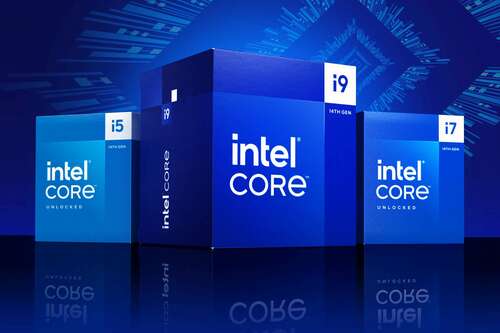
Intel is seeing a bit of a resurgence in the CPU market. The company seemed to be lagging behind AMD’s Ryzen chips, but ever since Intel’s 12th gen chips were released, the company has sought to innovate and do all-new stuff to overtake AMD and regain the CPU crown. Another stepping stone in this evolution is the release of the Intel Core Ultra chips, which continued building upon the innovations the 12th gen series featured while also putting out long-overdue changes, such as the Intel 4 (7nm) process. Now, Intel has another batch of new chips, although this one might be a bit messier.
At CES 2024, Intel launched a range of new chips, including 14th gen chips belonging to the Core HX-Series. There is one funny thing to note about this particular batch, and it’s the fact that it still has the Core “i” branding—the highest-end chip is the Intel Core i9-14900HX, with a total of 24 cores and 32 threads, and there is also the Intel Core i7-14700HX, with a total of 20 cores and 50% more efficiency cores than its predecessor. No Core Ultra here. The older branding is probably because these chips are based on Intel’s Raptor Lake Refresh architecture, just like the 14th gen desktop chips that were released not too long ago. The H and HX series are usually reserved for the mobile equivalents of desktop chips, so this isn’t too surprising.
Intel will likely finish this branding transition once 15th gen chips begin rolling around, but right now, we’ll have this occasionally confusing branding. This is not to say that these chips aren’t worth checking out, though. They’re probably one of the very best chips you can get on a laptop, so don’t let the branding confuse you.
Intel has also released a new batch of desktop processors as well. We already had 14th gen chips, and these are just new additions to that already existing lineup, with new chips such as the Intel Core i9-14900 and options going all the way down to the entry-level Core i3-14100. These are non-K variants, so the main difference between these and the ones that were already on store shelves is the fact that these don’t have an unlocked multiplier, and thus, are not overclockable. There are also F variants, which don’t have an integrated GPU, so these could be worth a shot if you have a dedicated GPU and want to save a few bucks.
Finally, there is also the Intel Processor 300 sitting at the very bottom of this desktop chip range. This would be what in previous generations would’ve been branded as a Pentium or Celeron chip, but Intel decided to drop that branding recently and replace it with just “Intel Processor.”
Finally, for thin and light laptops, we have the Intel Core U Series 1 chips, which for a change, actually feature the newer branding. These are non-Ultra chips, so they aren’t quite as performant as the ones that we’ve already seen launch on a couple of laptops, but they’re still really good, with the Intel Core 7 150U coming with 10 cores (2 performance, 8 efficiency) and up to 5.4 GHz boost frequencies. There is also the Intel Core 5 120U and the Intel Core 3 100U.
Since we know this is too much, below is the whole list of chips Intel announced.
- Intel Core i9-14900HX
- Intel Core i7-14700HX
- Intel Core i7-14650HX
- Intel Core i5-14500HX
- Intel Core i5-14450HX
- Intel Core i9-14900
- Intel Core i9-14900T
- Intel Core i9-14900F
- Intel Core i7-14700
- Intel Core i7-14700T
- Intel Core i7-14700F
- Intel Core i5-14600
- Intel Core i5-14600T
- Intel Core i5-14500
- Intel Core i5-14500T
- Intel Core i5-14400
- Intel Core i5-14400T
- Intel Core i5-14400F
- Intel Core i3-14100
- Intel Core i3-14100T
- Intel Core i3-14100F
- Intel Processor 300
- Intel Processor 300T
- Intel Core 7 150U
- Intel Core 5 120U
- Intel Core 3 100U
- Intel Core 3 100U (with IPU)
The desktop chips should land on store shelves within the next few weeks, and partners will also surely release prebuilt computers using at least some of these. Laptops powered by the mobile HX and series 1 chips should also pop up within the next few weeks, but you’ll have to keep an eye on announcements by laptop makers if you want to check them out.
Source: Intel (blog post, product sheet 1, product sheet 2, product sheet 3) via PCWorld

